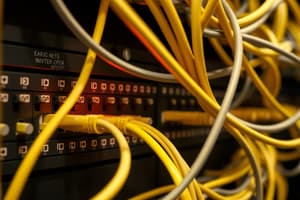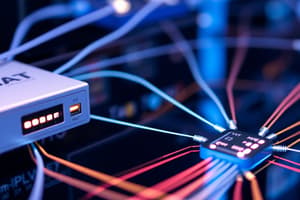Podcast
Questions and Answers
What is one of the main advantages of using computers in workplaces?
What is one of the main advantages of using computers in workplaces?
- They increase social interactions.
- They reduce the need for storage.
- They can automate repetitive tasks. (correct)
- They slow down information processing.
Which of the following is a disadvantage associated with prolonged computer use?
Which of the following is a disadvantage associated with prolonged computer use?
- Improved critical thinking.
- Enhanced productivity.
- Increased communication.
- Health issues such as eye strain. (correct)
What type of computer is typically used by large organizations to process vast amounts of data?
What type of computer is typically used by large organizations to process vast amounts of data?
- Laptop
- Mainframe Computer (correct)
- Tablet
- Personal Computer
Which of the following is NOT a common use of mainframe computers?
Which of the following is NOT a common use of mainframe computers?
What is a potential security risk associated with the use of computers?
What is a potential security risk associated with the use of computers?
Which of the following disadvantages can arise from excessive reliance on computers?
Which of the following disadvantages can arise from excessive reliance on computers?
Which advantage of computers allows for better access to information?
Which advantage of computers allows for better access to information?
What environmental issue is linked to computers?
What environmental issue is linked to computers?
What is the primary characteristic that differentiates supercomputers from other types of computers?
What is the primary characteristic that differentiates supercomputers from other types of computers?
Which of the following is NOT a use for Personal Computers (PCs)?
Which of the following is NOT a use for Personal Computers (PCs)?
Which application is NOT commonly associated with the use of supercomputers?
Which application is NOT commonly associated with the use of supercomputers?
What is a common application of Embedded Computers?
What is a common application of Embedded Computers?
Minicomputers are particularly well-suited for which of the following uses?
Minicomputers are particularly well-suited for which of the following uses?
Which of the following is NOT typically a function of Smartphones and Tablets?
Which of the following is NOT typically a function of Smartphones and Tablets?
What distinguishes a workstation from a supercomputer?
What distinguishes a workstation from a supercomputer?
Which of the following is NOT a typical use for servers?
Which of the following is NOT a typical use for servers?
Which task is primarily associated with Embedded Computers?
Which task is primarily associated with Embedded Computers?
What feature do Personal Computers (PCs) and Smartphones share?
What feature do Personal Computers (PCs) and Smartphones share?
What role do servers play in a network environment?
What role do servers play in a network environment?
Which of the following is a NOT typically a function associated with Personal Computers?
Which of the following is a NOT typically a function associated with Personal Computers?
Which of the following types of computers is specifically designed for high-performance computing tasks like animation and visual effects?
Which of the following types of computers is specifically designed for high-performance computing tasks like animation and visual effects?
In what way are Smartphones and Tablets categorized in computing?
In what way are Smartphones and Tablets categorized in computing?
In which scenario would a supercomputer be more advantageous than a minicomputer?
In which scenario would a supercomputer be more advantageous than a minicomputer?
What is a common use of Embedded Computers in Smart Homes?
What is a common use of Embedded Computers in Smart Homes?
Flashcards are hidden until you start studying
Study Notes
Advantages of Computers
- Computers are more efficient than humans, processing information quickly and boosting productivity.
- They automate repetitive tasks, reducing human error and improving overall efficiency.
- Offer tremendous storage capacity, easily accessing and managing large amounts of data.
- Facilitate communication through various mediums, including email, instant messaging, and video calls.
- Provide access to a wealth of educational resources and online courses, improving learning opportunities.
- Offer a variety of entertainment including games, music, movies, and social media.
- Revolutionized healthcare through electronic medical records, medical imaging, and telemedicine, resulting in enhanced patient care.
Disadvantages of Computers
- Prolonged computer use can lead to health issues like eye strain, muscle problems, and weight gain.
- Vulnerable to security risks such as malware, viruses, and hacking, posing threats to personal and sensitive information.
- Excessive reliance on computers can lead to a loss of manual skills and critical thinking abilities.
- Overuse can lead to reduced face-to-face interactions, contributing to social isolation.
- Their production and disposal contribute to environmental pollution and electronic waste.
- Computers can be expensive to purchase and maintain, particularly for individuals and small businesses.
- The use of computers raises privacy concerns as personal information can be easily accessed and misused.
Mainframe Computers
- Large, powerful computers used by large organizations for high-demand applications.
- They process massive amounts of data, handle multiple users simultaneously, and manage large-scale databases.
Mainframe Computer Uses
- Financial transactions
- Government and Public Sector
- Retail and E-commerce
- Healthcare
- Telecommunications
- Manufacturing and Supply Chain Management
- Academic and Research Institutions
- Airlines and Travel
- Enterprise Resource Planning (ERP)
- Cloud Computing and Virtualization
Supercomputers
- The most powerful and fastest computers.
- Used for complex scientific calculations, weather forecasting, nuclear simulations, and other tasks requiring massive computing power.
Supercomputer Uses
- Scientific Research and Simulations
- Medicine and Drug Discovery
- Artificial Intelligence (AI) and Machine Learning
- Engineering and Manufacturing
- Energy Exploration
- Cryptography and Cybersecurity
- Big Data Analytics
- Economic and Market Modeling
- Military and Defense Applications
- Space Exploration
- Social Science and Humanities Research
Minicomputers
- Smaller and less powerful than mainframes, but more powerful than personal computers.
- Often used as servers for small to medium-sized businesses and scientific applications.
Minicomputer Uses
- Process Control in Industrial Applications
- Small and Medium-Sized Businesses
- Network Management
- Academic and Educational Institutions
- Hospital Management Systems
- Small and Medium-Sized Databases
- Departmental and Workgroup Computing
- Banking and ATM Systems
- Engineering and CAD/CAM
- Web Servers and Hosting
- Smart Cities
Workstations
- High-performance computers used for specialized tasks such as computer-aided design (CAD), video editing, and scientific simulations.
- More powerful than PCs but less powerful than supercomputers.
Workstation Uses
- Animation and Visual Effects
- Game Development
- Graphic Design and Digital Content Creation
- Statistical Analysis
- VR/AR Content Creation
- Application Development
- Sound Design and Audio Production
Servers
- Computers dedicated to serving other computers or devices on a network.
- Store and manage data, host websites, and provide services like email and file sharing.
Server Uses
- Web Hosting and Web Servers
- File Storage and Sharing
- Database Management
- Email Hosting
- Application Hosting
- Data Backup and Recovery
- Gaming Servers
- Security and Authentication
- Print and Fax Servers
Personal Computers (PCs)
- The most common type of computer, designed for individual use.
- Come in various forms, including desktops, laptops, and tablets.
- Used for general computing tasks like word processing, browsing the internet, and gaming.
Personal Computer (PC) Uses
- Productivity and Office Work
- Internet Browsing and Communication
- Multimedia and Entertainment
- Education and Learning
- Graphic Design, 3D Modeling and Animation
- Music Production
- Remote Work
- Security and Monitoring
- Smart Home Management
Embedded Computers
- Specialized computers built into other devices or systems to control their operation.
- Found in appliances, cars, medical devices, and industrial machines.
Embedded Computer Uses
- Consumer Electronics (Smartphones and Tablets, Smart TVs and Media Players, Home Appliances, Wearables)
- Automotive Industry (Engine Control Units, navigation, Advanced Driver Assistance Systems, Electric Vehicles)
- Industrial Automation (Robotics, oil refining, chemical production, food processing, and Supervisory Control)
- Healthcare and Medical Devices
- Telecommunications (Routers and Modems, Base Stations and Signal Processing)
- Smart Homes and IoT Devices
- Transportation Systems
- Environmental Monitoring
- Gaming Consoles
Smartphones and Tablets
- Portable computers that combine computing power with communication capabilities.
- Used for a variety of tasks, including communication, entertainment, and productivity.
Smartphones and Tablets Uses
- Communication (Voice Calls, Text Messaging, Video Calls, Email)
- Internet Browsing (Web Browsing, Online Research)
- Social Media (Social Networking, Content Creation)
- Entertainment (Music Streaming, Video Streaming, Gaming, Photography and Videography, Taking Photos, Video Recording, Photo Editing)
- Productivity and Work (Document Creation, Spreadsheets and Presentations, Project Management)
- Navigation and Location Services (GPS Navigation, Location Sharing)
- Health and Fitness (Fitness Tracking, Health Monitoring)
Studying That Suits You
Use AI to generate personalized quizzes and flashcards to suit your learning preferences.




